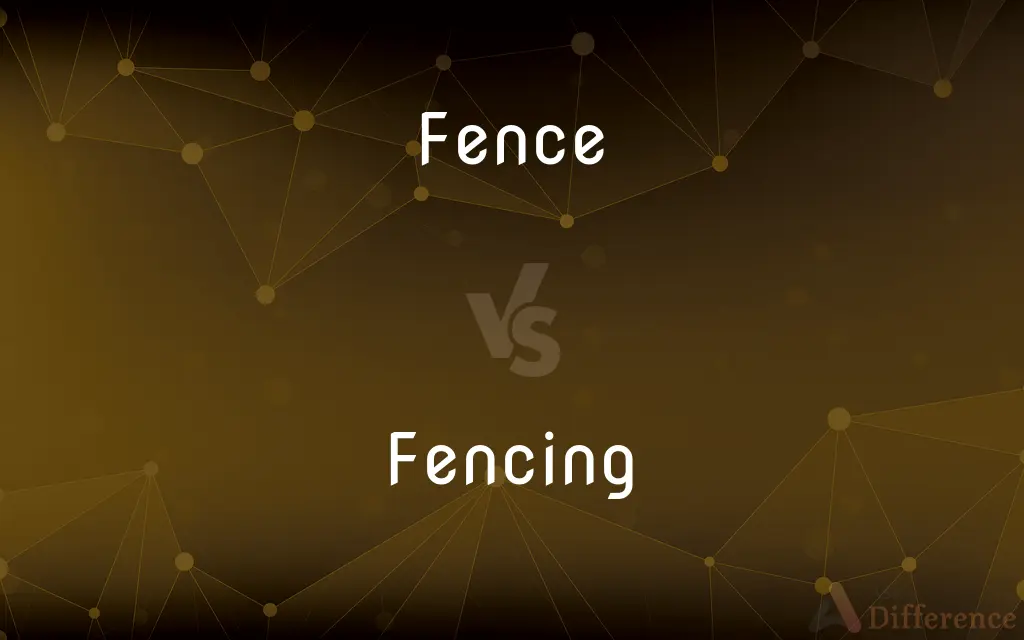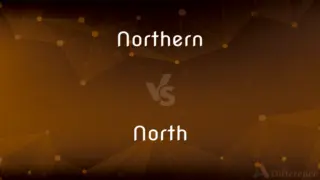Fence vs. Fencing — What's the Difference?
Edited by Tayyaba Rehman — By Fiza Rafique — Updated on March 11, 2024
Fence refers to a barrier enclosing or bordering a field, yard, etc., while fencing is the sport of fighting with swords.

Difference Between Fence and Fencing
Table of Contents
ADVERTISEMENT
Key Differences
Fence acts as a physical barrier for privacy, security, or marking boundaries, typically made from wood, metal, or other materials. Fencing, on the other hand, is a competitive sport involving two participants fighting with swords. It emphasizes skill, strategy, and agility, with the objective being to score points by making contact with the opponent in accordance with specific rules.
Fences are designed in various styles and heights, depending on their intended function, such as decorative, privacy, or security fences. Fencing requires protective gear, including masks, gloves, and specific clothing, to ensure the safety of the participants.
While a fence is a static structure meant to delineate boundaries or provide security, fencing is a dynamic, physically demanding activity that tests participants' physical and mental prowess. Whereas fences are a common sight in residential and commercial properties, fencing is often practiced in gyms or sports clubs, with participants ranging from amateurs to professional athletes.
Fences are often subject to local regulations concerning their height, materials, and location, reflecting their impact on communities and neighborhoods. Conversely, fencing as a sport is governed by international bodies, such as the Fédération Internationale d'Escrime (FIE), which set the standards for competition, equipment, and conduct.
The construction of a fence involves planning, measuring, and physical labor, with considerations for its aesthetic appeal and functionality. Fencing, however, is an art form and sport that develops over time with practice, coaching, and competition, focusing on precision, timing, and strategy.
ADVERTISEMENT
Comparison Chart
Definition
A structure serving as a barrier
A sport involving sword fighting
Primary Purpose
Enclosure and security
Competitive sport and physical activity
Material/Equipment
Wood, metal, vinyl, etc.
Swords (foil, epee, sabre), protective gear
Setting
Residential, commercial areas
Gyms, sports clubs
Skills/Requirements
Construction skills
Physical fitness, strategy, agility
Compare with Definitions
Fence
A barrier enclosing or bordering an area, used for privacy or security.
They built a wooden fence around the garden to keep out deer.
Fencing
The sport of fighting with swords, such as foils, epees, or sabres.
She took up fencing in college and quickly excelled.
Fence
An enclosure for animals.
The farmer repaired the fence to ensure the cows couldn't wander off.
Fencing
An activity for physical fitness and mental discipline.
Fencing practice is as much about mental preparation as physical skill.
Fence
A means of protection or defense.
The cybersecurity measures acted as a digital fence against hackers.
Fencing
A sport governed by international rules.
He competes in fencing tournaments under FIE regulations.
Fence
A structure serving to prevent or control access or escape.
The electric fence around the property deters intruders.
Fencing
A competitive activity requiring skill and agility.
Fencing demands quick reflexes and strategic thinking.
Fence
A divider between neighboring properties.
They agreed to split the cost of the new fence between their yards.
Fencing
A discipline with historical and cultural significance.
Fencing techniques have evolved from ancient combat practices.
Fence
A fence is a structure that encloses an area, typically outdoors, and is usually constructed from posts that are connected by boards, wire, rails or netting. A fence differs from a wall in not having a solid foundation along its whole length.Alternatives to fencing include a ditch (sometimes filled with water, forming a moat).
Fencing
Fencing is a group of three related combat sports. The three disciplines in modern fencing are the foil, the épée, and the sabre (also saber); winning points are made through the weapon's contact with an opponent.
Fence
A structure serving as an enclosure, a barrier, or a boundary, usually made of posts or stakes joined together by boards, wire, or rails.
Fencing
The art or sport of using a foil, épée, or saber in attack and defense.
Fence
An adjustable guide with a flat edge used on a table saw and positioned parallel to the plane of the cutting attachment in order to keep the board properly positioned for the cut to be made at the correct distance from the board's edge.
Fencing
Skillful repartee, especially as a defense against having to give direct answers.
Fence
One who receives and sells stolen goods.
Fencing
Material, such as wire, stakes, and rails, used in building fences.
Fence
A place where stolen goods are received and sold.
Fencing
A barrier or enclosure of fences.
Fence
(Archaic) A means of defense; a protection.
Fencing
Present participle of fence
Fence
To surround or enclose with a fence or other barrier.
Fencing
The art or sport of duelling with swords, especially with the 17th- to 18th-century European dueling swords and the practice weapons descended from them (sport fencing).
Fence
To separate or keep out by means of a fence or other barrier
Fenced off one field from another.
Fenced out the deer from the garden.
Fencing
Material used to make fences, fences used as barriers or an enclosure.
Fencing was erected around the field to keep the horses in.
Fence
To sell (stolen goods) to a fence.
Fencing
Receiving and buying of stolen goods.
Fence
To ward off; keep away.
Fencing
Disputing or debating in a manner resembling the art of fencers.
Fence
To defend.
Fencing
The materials used for building fences.
Fence
To practice the art or sport of fencing.
Fencing
The act of building a fence.
Fence
To avoid giving direct answers; hedge.
Fencing
The aggregate of the fences put up for inclosure or protection; as, the fencing of a farm.
Fence
To act as a conduit for stolen goods.
Fencing
A barrier that serves to enclose an area
Fence
A thin artificial barrier that separates two pieces of land or forms a perimeter enclosing the lands of a house, building, etc.
Fencing
Material for building fences
Fence
(informal) Someone who hides or buys and sells stolen goods, a criminal middleman for transactions of stolen goods.
Fencing
The art or sport of fighting with swords (especially the use of foils or epees or sabres to score points under a set of rules)
Fence
(by extension) The place whence such a middleman operates.
Fence
Skill in oral debate.
Fence
The art or practice of fencing.
Fence
A guard or guide on machinery.
Fence
(figuratively) A barrier, for example an emotional barrier.
Fence
A memory barrier.
Fence
(transitive) To enclose, contain or separate by building fence.
Fence
(transitive) To defend or guard.
Fence
(transitive) To engage in the selling or buying of stolen goods.
Fence
To engage in the sport of fencing.
Fence
To jump over a fence.
Fence
(intransitive) To conceal the truth by giving equivocal answers; to hedge; to be evasive.
Fence
That which fends off attack or danger; a defense; a protection; a cover; security; shield.
Let us be backed with God and with the seas,Which he hath given for fence impregnable.
A fence betwixt us and the victor's wrath.
Fence
An inclosure about a field or other space, or about any object; especially, an inclosing structure of wood, iron, or other material, intended to prevent intrusion from without or straying from within.
Leaps o'er the fence with ease into the fold.
Fence
A projection on the bolt, which passes through the tumbler gates in locking and unlocking.
Fence
Self-defense by the use of the sword; the art and practice of fencing and sword play; hence, skill in debate and repartee. See Fencing.
Enjoy your dear wit, and gay rhetoric,That hath so well been taught her dazzing fence.
Of dauntless courage and consummate skill in fence.
Fence
A receiver of stolen goods, or a place where they are received.
Fence
To fend off danger from; to give security to; to protect; to guard.
To fence my ear against thy sorceries.
Fence
To inclose with a fence or other protection; to secure by an inclosure.
O thou wall! . . . dive in the earth,And fence not Athens.
A sheepcote fenced about with olive trees.
Fence
To make a defense; to guard one's self of anything, as against an attack; to give protection or security, as by a fence.
Vice is the more stubborn as well as the more dangerous evil, and therefore, in the first place, to be fenced against.
Fence
To practice the art of attack and defense with the sword or with the foil, esp. with the smallsword, using the point only.
He will fence with his own shadow.
Fence
Hence, to fight or dispute in the manner of fencers, that is, by thrusting, guarding, parrying, etc.
They fence and push, and, pushing, loudly roar;Their dewlaps and their sides are bat ed in gore.
As when a billow, blown against,Falls back, the voice with which I fencedA little ceased, but recommenced.
Fence
A barrier that serves to enclose an area
Fence
A dealer in stolen property
Fence
Enclose with a fence;
We fenced in our yard
Fence
Receive stolen goods
Fence
Fight with fencing swords
Fence
Surround with a wall in order to fortify
Fence
Have an argument about something
Common Curiosities
How does fencing differ from other sports?
It involves swordplay, requiring unique skills like agility and strategic thinking.
What materials are commonly used for building fences?
Wood, metal (such as steel or aluminum), vinyl, and sometimes stone or brick.
What is the main purpose of a fence?
To provide privacy, security, and boundary delineation.
Can fencing be practiced by beginners?
Yes, with proper instruction and safety equipment, beginners can learn fencing.
Are there different types of fencing?
Yes, the sport includes foil, epee, and sabre, each with distinct rules.
What are the safety requirements for fencing?
Participants must wear protective gear, including masks, jackets, and gloves.
How long does a typical fencing bout last?
Bouts can vary but typically last until one fencer scores a set number of points.
Is fencing an Olympic sport?
Yes, fencing has been part of the Olympic Games since the modern Olympics began in 1896.
What skills are necessary for fencing?
Physical fitness, quick reflexes, tactical thinking, and precise movements.
Can fences be decorative as well as functional?
Absolutely, many fences serve both aesthetic and practical purposes.
How is a fencing match scored?
Points are scored by making legal hits on the opponent, with rules varying by weapon.
What is the significance of the different colors and materials used in fences?
Choices often reflect aesthetic preferences, durability, maintenance needs, and budget.
What are the environmental considerations for choosing fence materials?
Sustainability, recyclability, and local climate conditions can all influence material choice.
How does one choose the right type of fence for their property?
Consider factors like purpose (privacy, security), aesthetics, and local regulations.
How does one get started in fencing?
Joining a club or taking classes from a qualified instructor is a great way to begin.
Share Your Discovery

Previous Comparison
Oil vs. Petroleum
Next Comparison
Northern vs. NorthAuthor Spotlight
Written by
Fiza RafiqueFiza Rafique is a skilled content writer at AskDifference.com, where she meticulously refines and enhances written pieces. Drawing from her vast editorial expertise, Fiza ensures clarity, accuracy, and precision in every article. Passionate about language, she continually seeks to elevate the quality of content for readers worldwide.
Edited by
Tayyaba RehmanTayyaba Rehman is a distinguished writer, currently serving as a primary contributor to askdifference.com. As a researcher in semantics and etymology, Tayyaba's passion for the complexity of languages and their distinctions has found a perfect home on the platform. Tayyaba delves into the intricacies of language, distinguishing between commonly confused words and phrases, thereby providing clarity for readers worldwide.














































